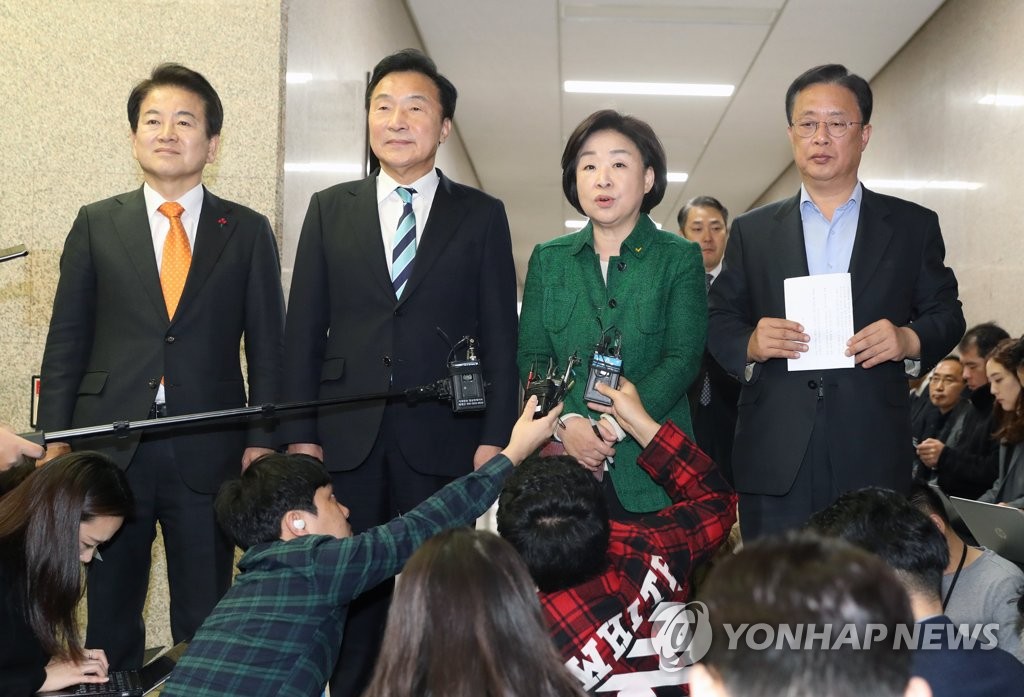- California Assembly OKs highest minimum wage in nation
- S. Korea unveils first graphic cigarette warnings
- US joins with South Korea, Japan in bid to deter North Korea
- LPGA golfer Chun In-gee finally back in action
- S. Korea won’t be top seed in final World Cup qualification round
- US men’s soccer misses 2nd straight Olympics
- US back on track in qualifying with 4-0 win over Guatemala
- High-intensity workout injuries spawn cottage industry
- CDC expands range of Zika mosquitoes into parts of Northeast
- Who knew? ‘The Walking Dead’ is helping families connect
Opposition party launches filibuster against electoral reform bill
South Korea’s main opposition party began a filibuster at the National Assembly on Monday night in a bid to block a ruling party-led bill on election law revision.
Joo Ho-young, a four-term lawmaker of the Liberty Korea Party, began to filibuster at around 9:49 p.m., soon after Speaker Moon Hee-sang introduced the electoral reform bill for a parliamentary vote.
Earlier in the day, the ruling Democratic Party (DP), three minor parties and one splinter group reached a final agreement on the details of bills on new parliamentary election rules and overhauling the prosecution, following weeks of intense negotiations.
The National Assembly convened a plenary session in the evening to deal with those proposals amid fierce protests from the main opposition Liberty Korea Party (LKP).
The filibuster is expected to continue on Wednesday when the current extra parliamentary session is set to end. This means that the electoral reform bill will be put to a vote automatically when a new extra parliamentary session convenes.


Rep. Joo Ho-young (front) of South Korea’s main opposition Liberty Korea Party (LKP) begins a filibuster against a ruling party-led bill to revise parliamentary election rules at the National Assembly in Seoul on Dec. 23, 2019, as Speaker Moon Hee-sang (back, L) and LKP floor leader Shim Jae-chul watch. (Yonhap)
In April, the DP and the three small parties put the bills on a parliamentary fast-track, despite objections from the LKP. Since then, the National Assembly has been embroiled in partisan tensions over the fast-track designation.
A key bone of contention was how to introduce a mixed-member proportional (MMP) representation system ahead of the April 15 general elections.
Under the deal, the number of directly elected seats and proportional representation (PR) slots will be kept at 253 and 47, respectively, in the 300-member National Assembly.
The number of PR posts to be allocated under the MMP representation scheme will be capped at 30.
The existing single-member district system has contributed to advancing South Korea’s democracy. But it has also generated many dead votes and has mostly benefited two large parties, aggravating deeply rooted regionalism.
In the MMP representation system, parliamentary seats are tied to the percentage of voters’ support for political parties.
Smaller parties voiced support for introducing the new PR system to increase their presence in South Korean politics.
Monday’s deal between the four sides did not include a contentious proposal to adopt a new election rule allowing a candidate to run for both a directly elected parliamentary seat and a PR slot.
The system permits a candidate who loses an election by a thin margin to get a PR seat. The three minor parties and one fringe group wanted the new rule, claiming that it will help root out regionalism.
But the DP opposed the proposal, voicing concerns that the system could be misused to ensure parliamentary seats for multiple-term lawmakers.
In April, the DP and the three minor parties — the minor conservative Bareunmirae Party, the liberal Party for Democracy and Peace and the progressive Justice Party — reached a tentative deal on electoral reform.
Monday’s deal backpedaled from the April agreement, under which the number of PR slots would have been raised to 75. It also scaled back from the parties’ attempt to raise the number of PR seats to 50.
The prosecution reform bill centers on establishing a separate unit to probe alleged corruption by high-ranking public officials and giving more investigative power to police.
For the DP, it is politically burdensome to push for electoral reform without the participation of the LKP. But the governing party appears to have set the goal to cement cooperation with other minor parties.
The LKP called its rivals’ agreement political collusion, vowing to deter the parliamentary passage of the measures.











